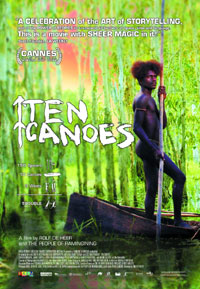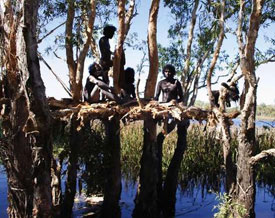 The indiginous people of the wilderness swamp region of Arafura, Australia, who starred in Ten Canoes (2006), have every right to feel proud of what they achieved. The indiginous people of the wilderness swamp region of Arafura, Australia, who starred in Ten Canoes (2006), have every right to feel proud of what they achieved.
They are physically beautiful on the screen, & their natural acting ability is undeniable. So I hope my analysis does not diminish their individual, personal achievement bringing the ancient times to life, as for me the film was not as winning as it has been for many other viewers.
To the Arafura aborigines, we have from the stars' own dewy sentiments, Ten Canoes has helped them reclaim a history. With English a very secondary language, Michael Dawu, who played one of the canoeists, said to director Rolf de Heer that the film was important because "our memory, she is gone. Old people, old women, they took our memory with them when they dies. Rolf, you bring us memory. We got culture because we got memory."
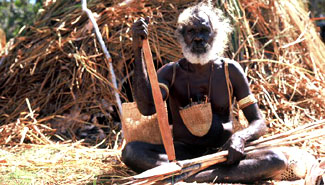 Moving as this is, soothing as it had to have been for de Heer's ego, the fact is, if a people who live neglected on a reserve well-documented for its horrendous conditions have lost the memory of their society, a white man born among the Nords is not going to bring it back to them. Moving as this is, soothing as it had to have been for de Heer's ego, the fact is, if a people who live neglected on a reserve well-documented for its horrendous conditions have lost the memory of their society, a white man born among the Nords is not going to bring it back to them.
This delusion, born of deprivation, only reinforced what I felt of the film as I was watching it, & disliking it.
Although there is a strong sense of a heroic stab at being "politically correct" & culturally significant, Ten Canoes relies on the same tricks & falsehoods that pop entertainment has used since the dawn of cinema when misrepresenting natives peoples of all sorts.
And I know my analysis will anger some people, so I am willing to relent insofar as what I have to say is "a" truth. Nobody has "the" truth, & what others see in the film is apt also to be "a" truth.
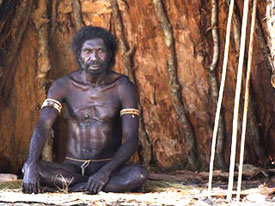 There was a lot of potential for Ten Canoes, which blends the idea of Documentary & Fiction, & has an Australian aboriginal cast with the most amazingly watchable, expressive faces, as well as fascinating to hear some of the Ganlabingu language. There was a lot of potential for Ten Canoes, which blends the idea of Documentary & Fiction, & has an Australian aboriginal cast with the most amazingly watchable, expressive faces, as well as fascinating to hear some of the Ganlabingu language.
The cinematography, however, approaches the banal. Oh, that's not entirely true, close-up portraits & family groupings look as good as National Geographic photography, but back the camera up a bit, & it looks no better than any tourist might do with an expensive digicam.
The profound beauty of the swampy countryside is so great it penetrates this bad photography, but it never really stops looking like videography done without benefit of light meter.
The tone of the film is sentimentality of the kind that afflicts The God's Must Be Crazy (1980) without being that funny or touching, Nanook of the North (1922) without being as historically significant as cinema, or any number of early semi-fictionalized travel films that existed to exploit the nudity of Fiji or Balinese Islanders, as in Virgins of Bali: Land of Love & Romance (1932).
And make no mistake, Ten Canoes projects a cultural context so one-dimensional it can only be compared to a Victorian World's Fair tableau of aboriginal life in which actual indigenous peoples are imported from around the world like circus animals to be displayed in tableaus constructed to fulfill a pre-existing expectation formulated by the Romantic Imagination of Europeans & Americans.
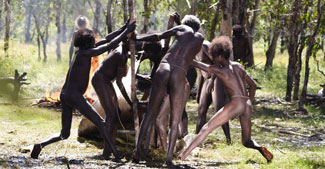 From a white point of view the perfect aborigine is one who if photographed today for National Geographic is only perfect if the same photograph could've been taken in 1935 or 1885. From a white point of view the perfect aborigine is one who if photographed today for National Geographic is only perfect if the same photograph could've been taken in 1935 or 1885.
Ten Canoes captures just that "loving" notion of the perfect aborigine. And I assert that such "love," romanticization, & concern is at its core entirely racist.
Set in the not too distant past before traditional ways were lost, the "documentary" portion of the film is in black & white, almost "instructional" in how Aborigines used to make canoes. As the instruction proceeds, one of the canoe makers expresses a jealous sentiment, which starts the elder among them telling a folktqale with a moral.
This "story" part of the film is in color, set in the ancient past, a fable conveying the simpleminded, lusty, superstitiously fearful, & above all primitive nature of uncivilized people, in accordance with the dominant culture's fancifulness.
That the aboriginal narrator (David Gulpilil) never stops telling you what's going on on screen is an indicator that the filmmakers couldn't tell a story visually in a visual medium, but needed every minute of it explained. The narrator seems to fret about what a crashing bore he is since he keeps insisting we pay attention.
Even if you accept the romanticization of spear-chucking savages as not inherently racist but in honor of a people, the film is frequently dull because crazily edited. If not for the black & white to indicate the later time period, you'd never know when or where the story was taking place. And the cinematography, though vaunted by the easily imrpessed, is merely pretty good for a tourist. So on just a technical level, it ain't all it begs to be.
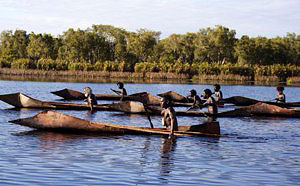 The story though simplistic, even formulaic for films idealizing the "uncivilized," is sometimes good in spite of itself, as the actors are so good looking. The story though simplistic, even formulaic for films idealizing the "uncivilized," is sometimes good in spite of itself, as the actors are so good looking.
Which can also be said for the indigenous people cast in Goona Goona: An Authentic Melodrama of the Isle of Bali (1932) which may have been melodramatic but in no way authentic, & has much the same story as Ten Canoes of a woman kidnapped by a sorcerer.
The middle-wife (Frances Djulibing) of a warrior goes missing & is later rumored to be alive with another family group, though the rumor has it wrong. Through territorial conflict & error, an innocent man is killed by spear, & his family demands retribution. That's about it.
Although Crusoe Kurddal as the warrior is individually marvelous, & Richard Birrinbirrin as the white-whiskered elder obsessed with honey is likewise a captivating character. Never mind that honeybees weren't introduced into Australia until 1822 & had no part in earlier Aborigine histories, underscoring the fact that this film is a Romanist fantasy with very little to do with a likely history.
I do find real power in storytelling that manages to dismiss entirely the significance of white civilization, & the Ten Canoes has a much finer attitude than such films as Dances with Wolves (1990) in which the only interesting ingredient is the Dakota Indians & their language, but the focus of the story has to be the only white man within a thousand miles.
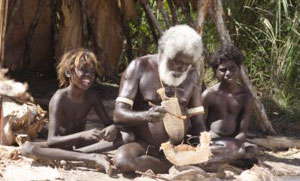 Or western films about Japan like Shogun (1980) or The Last Samurai (2003) that don't actually have faith in the subject matter & intrude upon their non-white world a white protagonist as otherwise it would be too alien for western audiences who only want to see themselves in a story. Nothing could be further from this sort of fault than Ten Canoes. Or western films about Japan like Shogun (1980) or The Last Samurai (2003) that don't actually have faith in the subject matter & intrude upon their non-white world a white protagonist as otherwise it would be too alien for western audiences who only want to see themselves in a story. Nothing could be further from this sort of fault than Ten Canoes.
Primary director De Heer, a Nordic Australian, stung by the recurring criticism of misappropriating & re-arranging aboriginal history, has denied imposing anything on the story that wasn't authentic to the people telling it. But the script is primarily De Heer's & was inspired by impressions from a peoples' own voice, but by the1930s photography of anthropologist Donald Thomson, the Edward S. Curtis of Northern Australia, a comparison some few will understand at once.
And the director's stated goal was to produce a script satisfying to "Western storytelling conventions," as if authentic folklore were too alien, bizarre, imperfect, to already possess solid story values. Which just isn't the case. So the director doth protest too much & needed much better responses to valid criticisms.
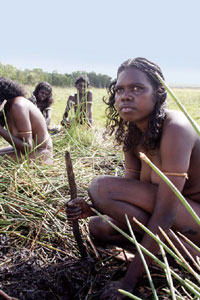 Some people mistakenly believe racism is only a negative feeling against another race, & won't immediately comprehend my criticism.
Some people mistakenly believe racism is only a negative feeling against another race, & won't immediately comprehend my criticism.
When white immigrants hunted down Tasmanian aborigines like game animals, moved Native Americans off rich land onto sterile land a thousand miles from all they knew, or lynched African Americans, that we can understand as racism, & then feel smugly happy we're not racists. And that means we have no part or responsibility in the causes of continuing poverty & turmoil in minority communities.
The dominant culture that no longer does these things still manages to keep indigenous peoples in second-class or outcast circumstances, apparently by magic since the dominant culture is so insistant it isn't racism. Fact is racism is also the patronizing & extreme romanticization of another people, the "noble savage" stereotype being the most common form of this kinder gentler subtler racism.
For African Americans this would be the loving image of the sweetness of slaves singing minstrel tunes in the cottonfields, happy as innocent children. For the Australian Aborigines, it's more on the order of a belief in pre-technological societies as heartwarming, whimsical, & like wee children never very complicated. Thus it's no big deal if life is harsh because rewards are to be had dream-time.
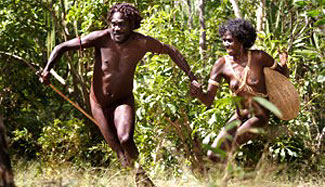 What all such romances invariably have in common is the certainty that these people are uncivilized. What all such romances invariably have in common is the certainty that these people are uncivilized.
A faked-primtive context permits the avoidance of all serious aspects of cultures now in crisis. Some critics have thought it a plus for Ten Canoes to do this, & one critic praised the white director specifically by faulting actual Aboriginal filmmakers for lacking such vision. But supplanting problems with primitivism is just a further step away from anything resembling truth.
Whether it is asserted in terms bleak hostile that "they are primitive therefore they don't matter" or in sweetened form as "they are primitive therefore we should admire them & preserve them just the way they are," the underlying assumption is of being uncivilized, therefore irrepairably different from "us."
It easy to believe that our ability to drive cars & shop in supermarkets & watch television or visit the Museum Of Trinkets Swiped From Vanished Peoples, has resulted in a more "civilized" culture than theirs. Really it has only given us the a differing technological capacity, one which permits greater savagery simultaneously at all quarters of the Earth.
In Birth of a Nation (1915) being uncivilized was justification for the Klan to "heroically" prey upon the superstitions of black people in order to kill them. Changing that outcome of the assumption is a good start, but so long as the assumption remains that some cultures represent civilization & other cultures represent primitivism, then the bad outcomes will always resurface. If in fact it were true that "they" are uncivilized & "we" are civilized, then empathy might well have been enough. But it's not true, so it's not enough.
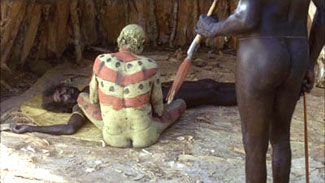 Ten Canoes is empathetic, & it's not enough. Well, perhaps cinema is not the place to really capture a complex tapestry of the actual interaction of land, people, belief, showing how this adds up to a richness of culture. Ten Canoes is empathetic, & it's not enough. Well, perhaps cinema is not the place to really capture a complex tapestry of the actual interaction of land, people, belief, showing how this adds up to a richness of culture.
And on any comparative scale of the treatment of all sorts of aboriginal peoples in world cinema, this one's got its heart in the right place. But that's an argument I just couldn't swallow while subjected to this Romanticist fantasy fobbed off as realism.
By romanticizing an idealized & frequently ignorant idea of primitivism, the inhumane conditions to which aboriginal peoples are subjected on reserves to this very day can more easily be overlooked & permitted to persist. In the white subconscious that pretends to admire closeness to nature while avoiding it for themselves, the only thing indigenous peoples really need to do is take their clothes off & get themselves some sharp sticks for spears. That way they'd have all they'll ever need, deserve, or want.
That also makes it their own fault if life sucks, because they chose to turn their backs on the old ways, clinging instead to the fringes of the dominant culture that persists in rejecting them. The Caucasian's tapestry of land, belief, & culture is as savage & territorial as that which they project onto the "other," & thereby Romanticized victims fall.
Aboriginal peoples are encouraged to believe it, too, that to be given a reserve & left to fend on their own is not benign neglect but the right thing to have happening to them, as anything more would destroy aboriginal integrity & identity, especially as they're not civilized enough to make primary decisions themselves & any assistance would be of an imposed kind.
copyright © by Paghat the Ratgirl
|
